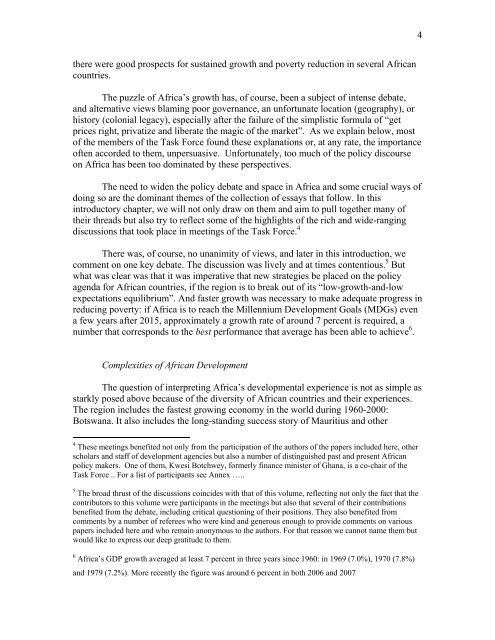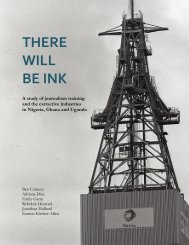Paper - Initiative for Policy Dialogue
Paper - Initiative for Policy Dialogue
Paper - Initiative for Policy Dialogue
Create successful ePaper yourself
Turn your PDF publications into a flip-book with our unique Google optimized e-Paper software.
4<br />
there were good prospects <strong>for</strong> sustained growth and poverty reduction in several African<br />
countries.<br />
The puzzle of Africa’s growth has, of course, been a subject of intense debate,<br />
and alternative views blaming poor governance, an un<strong>for</strong>tunate location (geography), or<br />
history (colonial legacy), especially after the failure of the simplistic <strong>for</strong>mula of “get<br />
prices right, privatize and liberate the magic of the market”. As we explain below, most<br />
of the members of the Task Force found these explanations or, at any rate, the importance<br />
often accorded to them, unpersuasive. Un<strong>for</strong>tunately, too much of the policy discourse<br />
on Africa has been too dominated by these perspectives.<br />
The need to widen the policy debate and space in Africa and some crucial ways of<br />
doing so are the dominant themes of the collection of essays that follow. In this<br />
introductory chapter, we will not only draw on them and aim to pull together many of<br />
their threads but also try to reflect some of the highlights of the rich and wide-ranging<br />
discussions that took place in meetings of the Task Force. 4<br />
There was, of course, no unanimity of views, and later in this introduction, we<br />
comment on one key debate. The discussion was lively and at times contentious. 5 But<br />
what was clear was that it was imperative that new strategies be placed on the policy<br />
agenda <strong>for</strong> African countries, if the region is to break out of its “low-growth-and-low<br />
expectations equilibrium”. And faster growth was necessary to make adequate progress in<br />
reducing poverty: if Africa is to reach the Millennium Development Goals (MDGs) even<br />
a few years after 2015, approximately a growth rate of around 7 percent is required, a<br />
number that corresponds to the best per<strong>for</strong>mance that average has been able to achieve 6 .<br />
Complexities of African Development<br />
The question of interpreting Africa’s developmental experience is not as simple as<br />
starkly posed above because of the diversity of African countries and their experiences.<br />
The region includes the fastest growing economy in the world during 1960-2000:<br />
Botswana. It also includes the long-standing success story of Mauritius and other<br />
4 These meetings benefited not only from the participation of the authors of the papers included here, other<br />
scholars and staff of development agencies but also a number of distinguished past and present African<br />
policy makers. One of them, Kwesi Botchwey, <strong>for</strong>merly finance minister of Ghana, is a co-chair of the<br />
Task Force .. For a list of participants see Annex …..<br />
5 The broad thrust of the discussions coincides with that of this volume, reflecting not only the fact that the<br />
contributors to this volume were participants in the meetings but also that several of their contributions<br />
benefited from the debate, including critical questioning of their positions. They also benefited from<br />
comments by a number of referees who were kind and generous enough to provide comments on various<br />
papers included here and who remain anonymous to the authors. For that reason we cannot name them but<br />
would like to express our deep gratitude to them.<br />
6 Africa’s GDP growth averaged at least 7 percent in three years since 1960: in 1969 (7.0%), 1970 (7.8%)<br />
and 1979 (7.2%). More recently the figure was around 6 percent in both 2006 and 2007














